'If I can do this, I can do anything': How this Tahoe nonprofit empowers travelers with disabilities
TAHOE — It's a bluebird day in Tahoe in early January, the sun is shining through a cloudless sky and the ground is covered in fresh powdery snow. The conditions for skiers and snowboarders arriving at Palisades Tahoe, California's largest ski resort and home of the 1960 Winter Olympics, couldn't get any better.
It's morning, and the resort just started up its chairlifts. At the base of the Subway Chair, a slope labeled green for its gentleness is a 10-year-old boy and student of a nearby elementary school. Emmanuel Luna is here with his father Pablo on a class trip to the slopes, and while the rest of his peers are somewhere else, he's getting a special lesson.
It's the first time he's gone skiing since his medical procedure last year, Pablo says. Emmanuel spent three months in the hospital recovering from an amputation, a necessary procedure after his cancer spread to his right leg. But he's made a good recovery, and he and his father are excited for a day of hitting the slopes.

Emmanuel is led out onto the snow in a bi-ski, a piece of adaptive ski gear where a skier sits in a seat with two skis attached to the bottom. In his hands are two outriggers used for balance and turning. (If someone doesn't have the ability to move their arms, someone else can help push along the bi-ski.)
Since it's his first time ever in this device, he's assisted by three instructors from Achieve Tahoe, a nonprofit at Palisades Tahoe that provides adaptive, affordable and inclusive recreation for people of all types of disabilities and all ages. Although the nonprofit's specialty is skiing, it's expanded to also include summer activities like kayaking, horseback riding, hiking, archery and waterskiing.
Awesome for all: LEGOLAND parks are becoming more autism-friendly. Here's how and what guests can expect.
30 feet of snow?: That much has fallen in some places in California as snow blankets huge swaths of state.
Serving the North Lake Tahoe area, like the mountains Palisades and Northstar, the nonprofit assists people with a wide variety of disabilities, like autism, down syndrome and muscular dystrophy. "As long as you can breathe (independently), you can come ski," Marina Gardiner, Guest Services Director at Achieve Tahoe, says.
At the heart of Achieve Tahoe's mission is to give people with disabilities the opportunity to feel empowered and challenged through a sport that helps build their confidence and a healthy lifestyle. "Our motto is, 'If I can do this, I can do anything,' " Gardiner says. "The more you can do for yourself, the more rewarding it is for that participant."
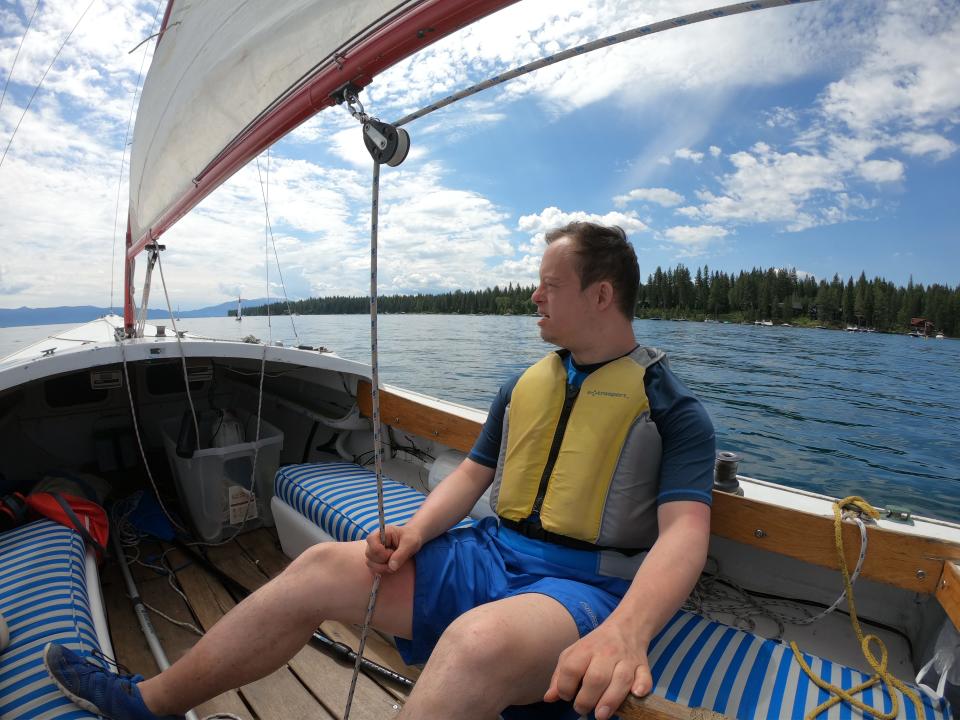
The Achieve Tahoe instructors take Emmanuel to practice on flat ground first, showing him how to steer the bi-ski by pushing down on the outriggers. Soon enough, they show him how to get onto the chairlift and he's off on his first run, with his dad following closely behind on his own snowboard.
A short while later, the family returns to the bottom of the run. When one of the instructors asks if Emmanuel wants to go again, he nods with a big smile and they go right back to the chairlift for a few more runs.
At first, Pablo was nervous that his son was going to be separated from his friends but Emmanuel ended up "super happy" and loving every minute of it. "It was amazing," Pablo said. "We never expected how fun it was going to be."
How does Achieve Tahoe work?
Across the mountain, Achieve Tahoe instructors can be spotted with their bright blue jackets.
With Achieve Tahoe's lessons, instructors give incremental steps fitted to the participant's needs. The nonprofit has over 200 volunteer instructors and nine full-time staff members (most are former volunteers.) Instructors have either a background in teaching skiing or occupational therapy and are required to earn different certifications in sports instructing and adaptive fitness topics. Each year, the team spends over 3,000 hours in training.
Over the past decade, the number of participants at Achieve Tahoe has boomed. The current 2022-2023 winter season is entirely booked until late April. Last winter, the nonprofit completed 1,732 lessons and had over 500 participants.
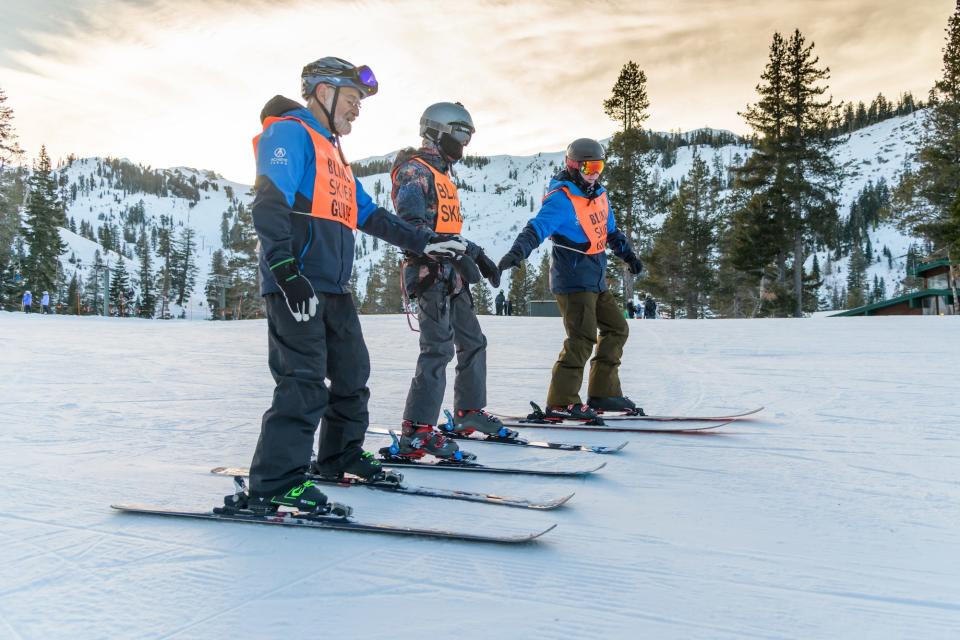
Everyone is welcome at Achieve Tahoe: Participants span all ages as long as they're older than four years old. It's a large mix of people too, like those who are returning to a sport after an injury or kids with cognitive disabilities whose parents want them to have an activity or sport.
"Their kid can be involved in a sport they didn't know they could be," Gardiner says. There are also other organizations and schools that organize group ski days with the nonprofit, like in Emmanuel's case.
Why is skiing a good adaptive sport?
Gardiner knows the importance of having a sport she can be challenged in – she's an avid skier who went through the nonprofit herself when she was a young adult. Born and raised in Tahoe, Gardiner grew up in a family of skiers. When she was 18 years old, she experienced a spinal cord injury that left her in a wheelchair. "I just missed being part of that social part of living and growing up in Tahoe."
Damaged medical devices while flying: This person's wheelchair was left in the rain with no guarantee that it won't happen again
A ski to remember: One of the world's largest ski jumps to reopen in Michigan's Upper Peninsula
She took lessons with Achieve Tahoe a couple of years after her injury "and never felt like I was in over my head." Eventually, she got her own adaptive ski and regularly hits the slopes today.
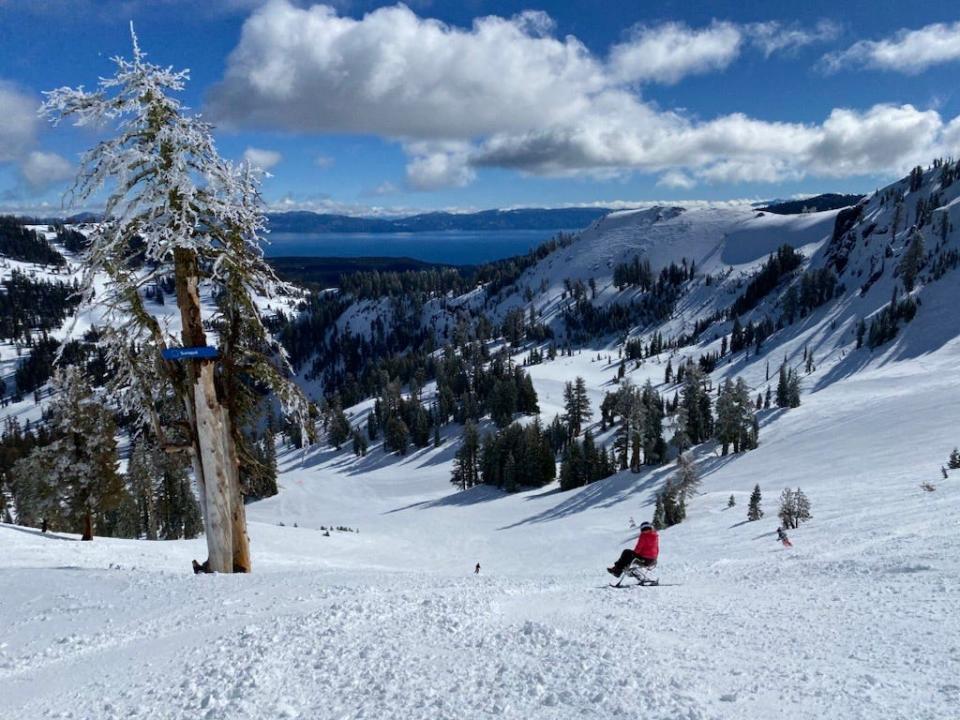
Besides bi-skis, there are ski bikes (a suspension seated ski), mono-skis (a seated ski with one ski instead of two) and even TetraSkis for someone who controls a wheelchair using "sipping" or "puffing" air into a tube, such as a quadriplegic with ALS. Achieve Tahoe has one of a handful of TetraSkis in the world, Gardiner says. There's also three-track, or standing skiing with one ski and two outriggers, causing three tracks in the snow, and four-track and slider, where a person is standing with two outriggers and two skis (yes, this makes four tracks). Adaptive ski gear has come a long way, Gardiner says.
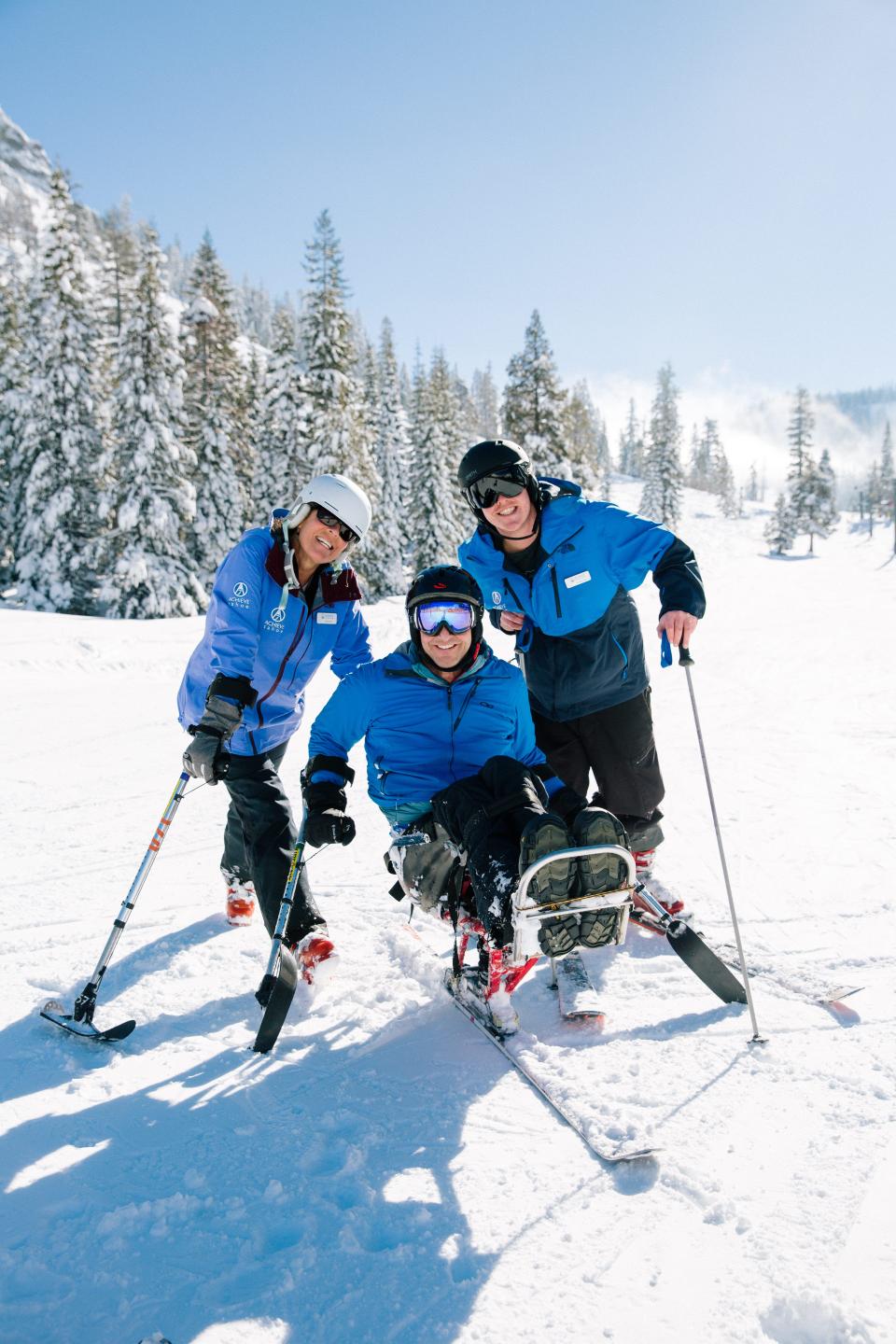
That sense of accomplishment goes a long way too.
Research has found that taking part in a sport can help those with disabilities reap not only physical benefits such as strength and balance but also improve their relationships with others and themselves through improved self-esteem and self-sufficiency.
"When your child has a new injury, and they're in a wheelchair, you just want to make their life better and help them, but I think parents forget to give them space to do things themselves," Gardiner says.
'The adaptive surcharge'
Skiing is a pricey sport. A lift ticket for one day, which gives you access to the mountain, can run one person up to $250, depending on how premier the mountain is. Then there's the gear: base layers, outer layers, goggles, gloves, a helmet, the skis themselves, the list goes on.
A 2014 report by the National Ski Areas Association found that the sport is skewing more toward the wealthy. Some resorts, like Palisades, are helping to remedy this by offering free or cheaper passes to underrepresented groups. People with disabilities can get a discounted season pass, allowing nearly unlimited visits for the year.
As typical of adaptive sports, adaptive skiing tends to cost more than nonadaptive skiing. One Achieve Tahoe staff member called this nuanced barrier to access "the adaptive surcharge."
"(Without a disability,) you could sign up for a half-day group lesson for $150-200," Gardiner says. "But a kid with autism, the parents can't put them in a regular group lesson because that just won't work. We can provide the right kind of lesson at the same cost as the group lesson."
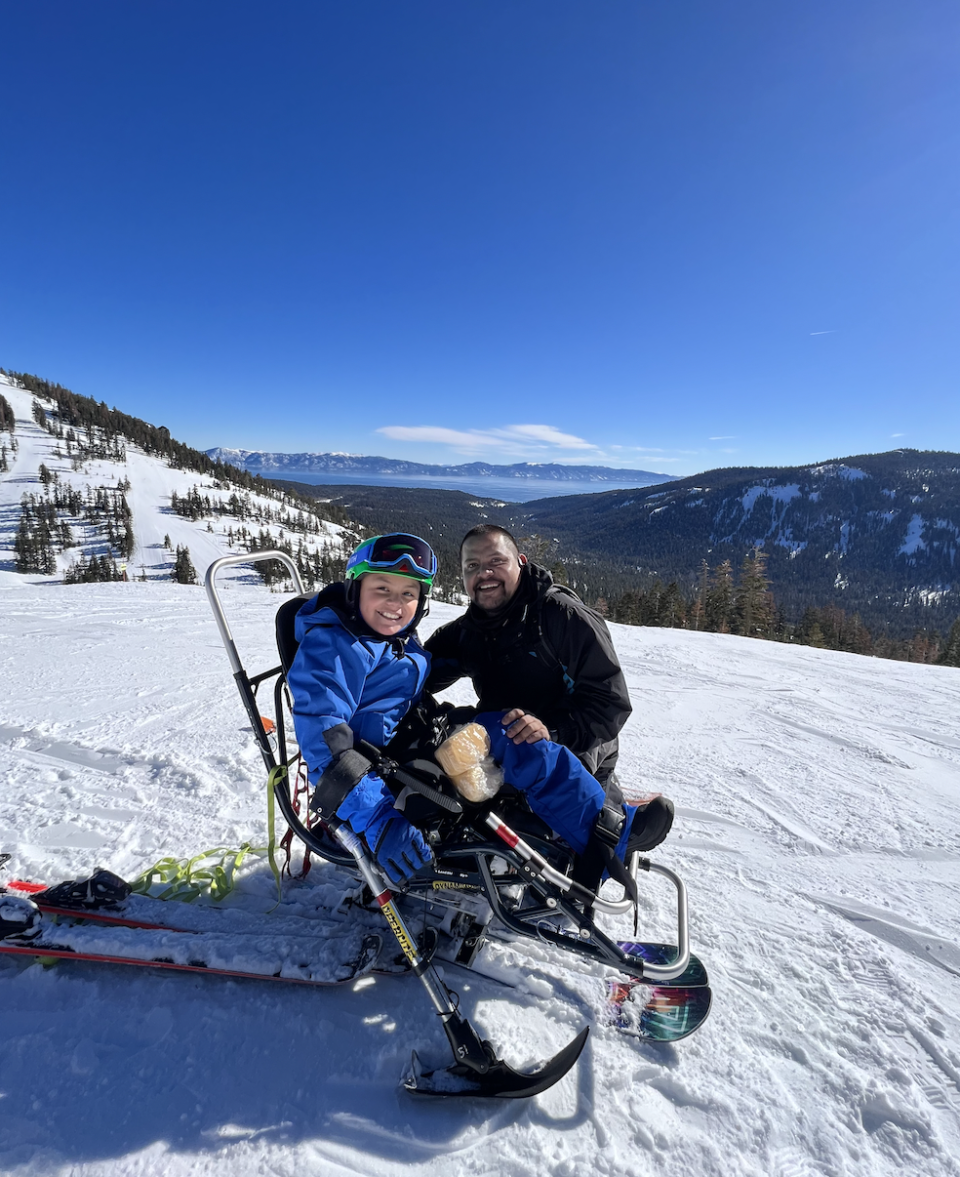
She adds, "It really cuts off access when it costs more for an adaptive lesson."
Every lesson with the nonprofit comes with a lift ticket for the day so they can enjoy the slopes without paying even more. The nonprofit also offers scholarships to help some people cover the costs of lessons.
Emmanuel was granted a scholarship after his first lesson with Achieve Tahoe and is already signed up to participate in the next winter season. His time with the nonprofit is just beginning. "We didn't know the type of things he can do up here (in Tahoe)," Pablo said. "We never knew about (Achieve Tahoe)."
The family went back the week after Emmanuel's first lesson for another and he took on a more difficult run. He's hooked. "We were there all day long," Pablo Luna said.
Kathleen Wong is a consumer travel reporter based in Hawaii. You can reach her at kwong@usatoday.com
This article originally appeared on USA TODAY: Achieve Tahoe makes adaptive skiing accessible for disabled people
